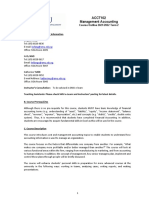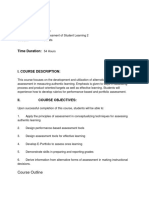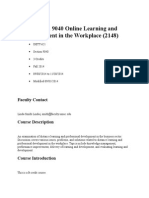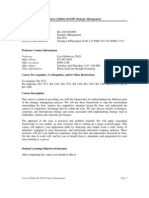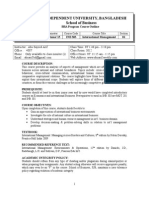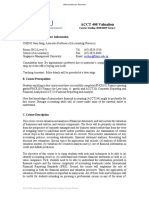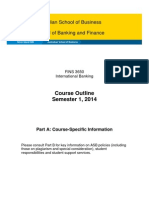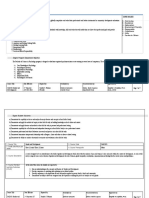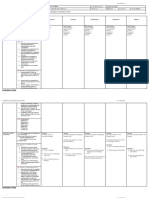MGT 4001 Managing Professional Development
MGT 4001 Managing Professional Development
Uploaded by
vampire79Copyright:
Available Formats
MGT 4001 Managing Professional Development
MGT 4001 Managing Professional Development
Uploaded by
vampire79Original Description:
Original Title
Copyright
Available Formats
Share this document
Did you find this document useful?
Is this content inappropriate?
Copyright:
Available Formats
MGT 4001 Managing Professional Development
MGT 4001 Managing Professional Development
Uploaded by
vampire79Copyright:
Available Formats
MGT 4001 Managing Professional Development
1. Course Information
Course Title Course Code Department Prerequisite Co-requisite Semester Course Credit Minimum Contact hours : : : 3 credit hours 45 hours : : : : : Managing Professional Development MGT 4001 Management GE 3103 None
2. Instructor Information
Name of Instructor Contact Information Email Office Hours : : : :
3. Course Description
This course strives to enable students to assess and develop a full range of personal skills with a view to improving the professional skills required in the workforce. It will also help to develop the students knowledge of how to improve execution of the roles required to be played by employees organizing and managing. It will further help to improve on-the-job performance of an individual to promote self enhancement in terms of both personal and professional knowledge.
4. Course Objectives
This course will help the students understand and practice the professional skills needed to make a difference in the organization of the future as a career advantage. Besides academics, other skills as relationship building, effective selfpresentation, self-confidence, and motivation enable the students to excel in the world of work and continue to grow personally and professionally.
5. Course Learning Outcomes
Students on completion of the course will be able to 1. Determine how development. self-management of learning will lead to lifelong
2. Assess and develop a full range of personal skills with a view to improving professional skills. 3. Implement a system of continual review of personal and professional development plan. 4. Analyze self management in relation to effective team management with a view to meeting objectives.
6. Course Calendar
Wee k Topics Learnin g Resour ce Chapter 1 Learning activities Assessme nt Tools Learning Outcome s
Self-Managed learning
Classroom lecture Discussion
Quiz 1
2 Learning Styles
Chapter 1
Classroom Lecture Discussion
Assignmen t1 Due: 4th week Mid Term Exam
1,2,3
Lifelong Learning
Chapter 1
Classroom Lecture Case Study
Case Study Q/A work
1,2,3
4 5
Assessment of Learning Effective learning
Chapter 1 Chapter 1
Lecture Discussion Lecture Class Activity
Quiz 2 Assignmen t2 Due: 6th
2,3,4 1,3,4
Wee k
Topics
Learnin g Resour ce
Learning activities
Assessme nt Tools
Learning Outcome s
week Mid Term Exam 6 Approaches to learning Self-Appraisal Chapter 1 Presentatio n Discussion Presentatio n 1,2,3,4
Interpersonal Skills and Transferable skills Working with others Revision and Mock Test
Chapter 2 Recap
Quiz 3 Discussion Review 1,2,3,4
8 9 Communication styles and techniques
Mid Term Examination Chapter 2 Lecture Discussion Lecture Presentatio n Discussion Chapter 3 Lecture Discussion Case Study 3 Prioritizing workloads Using time effectively Deadlines Case Study Q/A Assignmen t3 Due: 12th Week 1,2,3,4 Quiz 3 1,2,3,4
10
Communication methods Delivery formats Communication methods
Chapter 2
1,2,3,4,
11 Time Management
12
Professional and personal development
Chapter 4
Lecture Case Study 4 Lecture Case Study 5
Quiz 4 Case Study Q/A Case Study Q/A
12,3,4
13
Skills and competencies Development Plan
Chapter 4
1,2,3,4
Wee k
Topics
Learnin g Resour ce
Learning activities
Assessme nt Tools
Learning Outcome s
14
Portfolio building Revision Mock Test
Chapter 4 Recap
Discussion Review Presentatio n
Course Review Q/A
1,2,3,4
15
Final Examination
7. Assessment Methods and Plan
Students performance will be assessed based on assignments, quizzes and case study given as mentioned in the course calendar, mid-term and final examination. The mid-term exam conducted during the 8th week will consist of the syllabus from the first half of the semester. The mid-term and final examinations will constitute a significant portion of overall grade. The final examination will consist of the material from the second half of the semester. The final examination is conducted during the 15th week. Students have to strictly follow the deadline instructions failing which the students will not be awarded marks for that particular assessment method. If a student for some reason, (because of personal emergency, falling sick) misses the mid-term or final examination he/she should report immediately to the course instructor and the Vice President Academic Affairs for an appropriate action to be taken. Incomplete course work or missing out any examination will result in F grade, unless the student submits an Incomplete coursework in order to get an I grade upon the agreed terms/conditions after 2 weeks of start of the next semester, automatically this I grade becomes F if the student does not fulfill the requirements of the course.
8. Course Methodology
This course is delivered in a classroom environment as lectures, presentations using PowerPoint slides. Students are encouraged to be more interactive with instructor and fellow students. For all case study activities, students are required to read about and discuss each case and answer the questions. After 7th week
there will be Mid-term Examination and the Final examination will be in the 15th week.
9. Learning Resources
Required Text Book: BPP Learning Media ( 2010) Management: Leading People and Professional Development Pub: Amazon ISBN: 978-0-7517-9041-2 Additional Resources: Hughes R.L., Ginnett R.C., Curphy G.J. (2009) Leadership- Enhancing the Lessons of Experience (6th Edition) ISBN: 978-007-126359-7 Bennis, Warren and Goldsmith, Joan (2003); Learning to Lead: A Work book on Becoming a Leader; 3rd. Ed. ISBN 13: 978-07382-09-050 Magazines: Business Week, Harvard Business Review, Fortune 500, Fortune 500 NewsPaper: The Economic Times
10. Other Course Requirements
Students are encouraged to work together as a group with other classmates in order to help high-level understanding of the material presented in the course. Any solutions to assignments, exams or projects presented for credit must be work created on their own. ECMIT always encourages students to present their work experience and ideas to make sessions more interactive and to keep updated with the current trends.
11. Applicable Policies
Continuous Assessment Scheme
Class Activities(Case Study, Attendance) Assignment 1 Assignment 2 Mid-Term Exam Quiz Assignment 3 Final Exam 10% 5% 5% 20% 10% 20% 30%
Grade Calculation & Points
A=90-100%, (4.0) B+=85-89%, (3.5) B=80-84%, (3.0) C+=75-79%, (2.5) C=70-74%, (2.0) D+=65-69%, (1.5) D=60-64% (1.0) F=0-59% (0.0)
Attendance Policy
Students are required to attend a minimum of 70% of all classes for every course. Students who do not fulfill this requirement endanger their academic success. There are special forms for dealing with excessive absences. If the cause of absence is illness, accident, or a similar event, the student must notify the instructors and the Division Chair in writing, and must make arrangements with the lecturer for catching up on material missed.
Academic Dishonesty
Students are expected to maintain integrity of the course by honest behavior from their fellow students and avoid plagiarism, and on all courseworks, collusion and cheating.
Penalty for Dishonesty
Refer: The ECMIT Academic Dishonesty & Misconduct Policy.
12. Mapping of Learning Outcomes and Assessments
Assessment Grade Weighta ge 10% Mapping with Course LOs 1 x 2 x 3 x 4 x
Attendance, Class
Participation, Mock Tests Quiz Assignment 1 Assignment 2 Mid-Term Exam Assignment 3 Final Exam 10% 5% 5% 20% 20% 30% x x x x x x x x x x x x x x x x x x x x x
13. Certification
This course is authorized for use by:
. .. Chair, Business Department Date
. .. Course Instructor
Date
You might also like
- Combined Science PDFDocument57 pagesCombined Science PDFRadhika Meher58% (33)
- OBEdized Coourse SyllabusDocument9 pagesOBEdized Coourse SyllabusJowan Sia75% (4)
- SMK K48isb Jan-April 2024Document9 pagesSMK K48isb Jan-April 2024Anh Nguyen Tran NhatNo ratings yet
- Syllabus: MBA 671 Strategic Management Student EditionDocument17 pagesSyllabus: MBA 671 Strategic Management Student EditionkehedsiahNo ratings yet
- ACCT102 MA Course Outline 2021-2022 S2 FinalDocument9 pagesACCT102 MA Course Outline 2021-2022 S2 FinalCherlin LeongNo ratings yet
- Entrepreneurship & SMEs MGT641-CDFDocument8 pagesEntrepreneurship & SMEs MGT641-CDFMai El RihanyNo ratings yet
- MGT 578Document4 pagesMGT 578Ray LeoNo ratings yet
- 105syl Y3Document7 pages105syl Y3api-196355369No ratings yet
- MGT 321 Courseoutline Summer15Document5 pagesMGT 321 Courseoutline Summer15souravsamNo ratings yet
- Writing Good Exam QuestionDocument78 pagesWriting Good Exam Questiongus_lionsNo ratings yet
- Disclaimer: Course Schedule Is Subject To Change and You Will Be Responsible For Abiding by AnyDocument4 pagesDisclaimer: Course Schedule Is Subject To Change and You Will Be Responsible For Abiding by AnyFahmi RapsanjaniNo ratings yet
- ECON3116 International Trade PartA S22013Document10 pagesECON3116 International Trade PartA S22013smith858No ratings yet
- Strategic Management - MGT532: Course DescriptionDocument9 pagesStrategic Management - MGT532: Course DescriptionMohamed KhaledNo ratings yet
- Task 1 - Self-Assessment and Professional Learning PlanDocument6 pagesTask 1 - Self-Assessment and Professional Learning Planapi-335309350No ratings yet
- David Reiner SPED 498 - Internship Planning Cycle For Lesson Plan: Evidence of Student LearningDocument30 pagesDavid Reiner SPED 498 - Internship Planning Cycle For Lesson Plan: Evidence of Student Learningapi-285055482No ratings yet
- Silabus SPM PDFDocument4 pagesSilabus SPM PDFAco AritonangNo ratings yet
- Course SyllabusDocument11 pagesCourse SyllabusGlicerio Peñueco Jr.No ratings yet
- Training and DevelopmentDocument6 pagesTraining and DevelopmentSandy ChakrabortyNo ratings yet
- SEP 2023 FIN2104 Subject OverviewDocument5 pagesSEP 2023 FIN2104 Subject OverviewEldon LiewNo ratings yet
- Module 11Document7 pagesModule 11Emily V. OrtojanNo ratings yet
- UoSOutline MKTG1001 2011Document11 pagesUoSOutline MKTG1001 2011michael_todd_44No ratings yet
- Dett 621 9040 SyllabusDocument30 pagesDett 621 9040 Syllabusapi-241955651No ratings yet
- UT Dallas Syllabus For Ba4305.005.11f Taught by Livia Markoczi (lxm055000)Document23 pagesUT Dallas Syllabus For Ba4305.005.11f Taught by Livia Markoczi (lxm055000)UT Dallas Provost's Technology GroupNo ratings yet
- Schaums Outline of Probability and Statistics Third Edition 2009Document8 pagesSchaums Outline of Probability and Statistics Third Edition 2009shashank jakkaNo ratings yet
- Psy 607a Syllabus (2) - 5Document10 pagesPsy 607a Syllabus (2) - 5canfieldml12No ratings yet
- Fundamentals of MarketingDocument8 pagesFundamentals of MarketingwunnawinchesterNo ratings yet
- HRM 390 Course OutlineDocument3 pagesHRM 390 Course OutlineNafees hasanNo ratings yet
- Managerial Accounting Sec A (Mba)Document2 pagesManagerial Accounting Sec A (Mba)Muhammad A Ismaiel100% (1)
- LSPR Syllabus EStratPRPlanning p08Document13 pagesLSPR Syllabus EStratPRPlanning p08elearninglsprNo ratings yet
- Summative AssessmentDocument15 pagesSummative AssessmentHoneylyn Vee SabatinNo ratings yet
- Syllabus-Service-Excellence Sep 2023Document17 pagesSyllabus-Service-Excellence Sep 2023Duong BuiNo ratings yet
- Assessment of Student Learning 1: Bachelor of Special Needs EducationDocument3 pagesAssessment of Student Learning 1: Bachelor of Special Needs EducationGellirose S. BantayanNo ratings yet
- ECO610-70 Syllabus H2 2020-2021Document8 pagesECO610-70 Syllabus H2 2020-2021muzzamilNo ratings yet
- MNGT2515 International Business - Course Outline - Spring 2014Document5 pagesMNGT2515 International Business - Course Outline - Spring 2014AliYousufNo ratings yet
- Econ1101 Course OutlineDocument18 pagesEcon1101 Course OutlineJoannaNo ratings yet
- Faculty of Education Graduate Studies ProgramDocument4 pagesFaculty of Education Graduate Studies Programapi-528144614No ratings yet
- ACCT 320 Auditing Fall 2014Document5 pagesACCT 320 Auditing Fall 2014Jonathan ZhuNo ratings yet
- Overview of The Course:: Bangladesh University of Professionals Course Outline Business CommunicationDocument4 pagesOverview of The Course:: Bangladesh University of Professionals Course Outline Business CommunicationAl Arafat RummanNo ratings yet
- Assessment and EvaluationDocument6 pagesAssessment and Evaluationkebedebeimnet16No ratings yet
- Subject OutlineDocument8 pagesSubject OutlineGurrajvin SinghNo ratings yet
- UoS Outline FINC2011 SEM2 2014 ApprovedDocument6 pagesUoS Outline FINC2011 SEM2 2014 ApprovedericaNo ratings yet
- Report Me KrishaDocument62 pagesReport Me KrishalarenNo ratings yet
- Acct 402Document6 pagesAcct 402zhentang89No ratings yet
- 0697 Assignmnt No-01Document21 pages0697 Assignmnt No-01Muhammad Ibrahim HamdardNo ratings yet
- Course Outline 2021Document6 pagesCourse Outline 2021james machariaNo ratings yet
- UT Dallas Syllabus For Ba3365.003.07s Taught by Yuanping Ying (Yxy055100)Document7 pagesUT Dallas Syllabus For Ba3365.003.07s Taught by Yuanping Ying (Yxy055100)UT Dallas Provost's Technology GroupNo ratings yet
- Course Outline-Inb303 - 2015Document3 pagesCourse Outline-Inb303 - 2015api-294244172No ratings yet
- + RBPM Learning GuideDocument6 pages+ RBPM Learning GuidePeter KoromaNo ratings yet
- Acct408 - Cheng Nam SangDocument5 pagesAcct408 - Cheng Nam SangHohoho134No ratings yet
- Module 5 Discussion 56.editedDocument4 pagesModule 5 Discussion 56.editedkimberlyarileyNo ratings yet
- DO8s 2015group-9Document58 pagesDO8s 2015group-9Angelica SnchzNo ratings yet
- UNSW FINS3650 Course OutlineDocument14 pagesUNSW FINS3650 Course OutlineFanny ChanNo ratings yet
- Accounting SyllabusDocument9 pagesAccounting Syllabusdanya_1997No ratings yet
- Standard 4Document15 pagesStandard 4hima67No ratings yet
- Assessment of Student Learning PDFDocument27 pagesAssessment of Student Learning PDFSwami Gurunand100% (2)
- ECON5103 Business Economics S12012Document10 pagesECON5103 Business Economics S12012Atif Rao100% (1)
- Management 4219 Strategic Management: Ofemb@umsl - EduDocument7 pagesManagement 4219 Strategic Management: Ofemb@umsl - EduMNo ratings yet
- Course Outline 2015Document15 pagesCourse Outline 2015api-284695904No ratings yet
- Assessment in Learning 1Document27 pagesAssessment in Learning 1Jonalyn RogandoNo ratings yet
- How to Practice Before Exams: A Comprehensive Guide to Mastering Study Techniques, Time Management, and Stress Relief for Exam SuccessFrom EverandHow to Practice Before Exams: A Comprehensive Guide to Mastering Study Techniques, Time Management, and Stress Relief for Exam SuccessNo ratings yet
- The Leaders of Their Own Learning Companion: New Tools and Tips for Tackling the Common Challenges of Student-Engaged AssessmentFrom EverandThe Leaders of Their Own Learning Companion: New Tools and Tips for Tackling the Common Challenges of Student-Engaged AssessmentNo ratings yet
- LAW 3201 - Business LawDocument8 pagesLAW 3201 - Business Lawvampire79No ratings yet
- Game Theory PDFDocument210 pagesGame Theory PDFvampire79No ratings yet
- LAW 3201 - Business LawDocument8 pagesLAW 3201 - Business Lawvampire79No ratings yet
- Game Theory PDFDocument210 pagesGame Theory PDFvampire79No ratings yet
- DivisionDocument1 pageDivisionvampire79No ratings yet
- Shiekh ZayedDocument3 pagesShiekh Zayedvampire79100% (1)
- Sony Corporation Market ManagementDocument39 pagesSony Corporation Market Managementvampire79100% (1)
- 1-Leadership Effectiveness?Document5 pages1-Leadership Effectiveness?vampire79No ratings yet
- What Do We Know About The Use of Social Media in Medical Education?Document5 pagesWhat Do We Know About The Use of Social Media in Medical Education?boygembelNo ratings yet
- Đề Thống Nhất 2022-2023Document7 pagesĐề Thống Nhất 2022-2023Huyền TrangNo ratings yet
- NUS SOC MLDA Brochure 090523 V8Document23 pagesNUS SOC MLDA Brochure 090523 V8KF YipNo ratings yet
- MIS500 Assessment 1 Brief - EssayDocument5 pagesMIS500 Assessment 1 Brief - Essaysherryy619No ratings yet
- Letter of Introduction and CV L WaringDocument4 pagesLetter of Introduction and CV L Waringapi-333662801No ratings yet
- LP With ANNOTATIONS-Q3 Combinations DerivedDocument8 pagesLP With ANNOTATIONS-Q3 Combinations DerivedMa Candie Edep CamachoNo ratings yet
- 6 - RNN LSTM & GruDocument14 pages6 - RNN LSTM & Gruabbas1999n8No ratings yet
- The Hypnosis and Neurosis of EducationDocument2 pagesThe Hypnosis and Neurosis of EducationUzair UmairNo ratings yet
- Sapthagiri Medical College BangaloreDocument10 pagesSapthagiri Medical College Bangalorepentagoneducation100% (1)
- New Module ICT May 2021Document67 pagesNew Module ICT May 2021Martin Kalinga MartinNo ratings yet
- COT 1 - Manuel Santos Lesson Exemplar-November 26, 2021Document6 pagesCOT 1 - Manuel Santos Lesson Exemplar-November 26, 2021MICHAEL ANORA100% (1)
- Activity 1 Weighted MeanDocument1 pageActivity 1 Weighted MeanMar Gauden AceronNo ratings yet
- 2 Philosophical InquiryDocument7 pages2 Philosophical InquirylenieNo ratings yet
- Obtlp Gad101 2ND Sem 2019 2020Document7 pagesObtlp Gad101 2ND Sem 2019 2020Jennifer MayanoNo ratings yet
- Chapter 2Document18 pagesChapter 2Antonette Myr Atis InocNo ratings yet
- Working As A Teacher in Finland With A Foreign Qualification 1Document15 pagesWorking As A Teacher in Finland With A Foreign Qualification 1Daniel millerNo ratings yet
- Contact Us Unit 4Document5 pagesContact Us Unit 4Emmanuel PaulinoNo ratings yet
- 2nd Grade Math Graph Lesson PlanDocument8 pages2nd Grade Math Graph Lesson Planapi-252982922No ratings yet
- English CompositionDocument6 pagesEnglish CompositionMaria Paula Peña CamachoNo ratings yet
- Hsp431-Sensory-Overview-Support-Plan 1Document6 pagesHsp431-Sensory-Overview-Support-Plan 1api-629413258No ratings yet
- 223 Copy and Paste Final Report Card Comments (2024)Document20 pages223 Copy and Paste Final Report Card Comments (2024)starface nicholasNo ratings yet
- Dressmaking 11 LO 1.1 IRABDocument30 pagesDressmaking 11 LO 1.1 IRABWendy ArnidoNo ratings yet
- Kindergarten-Dll Week 19 (October 9-13, 2017) AsfDocument11 pagesKindergarten-Dll Week 19 (October 9-13, 2017) AsfKristel Anne Macatuggal LugoNo ratings yet
- Requirement of Content:: Group AssignmentDocument5 pagesRequirement of Content:: Group AssignmentThiên HươngNo ratings yet
- Pess Work PlanDocument1 pagePess Work PlanRESTTIE DAGUIO100% (3)
- ATHE Level 3 Diploma in AccountingDocument32 pagesATHE Level 3 Diploma in AccountingPartho DhakaNo ratings yet
- Document OriginalDocument4 pagesDocument OriginalCrisia ConstantineNo ratings yet
- 297 - Inglés General II - 1st SessionDocument23 pages297 - Inglés General II - 1st SessionAbraham RuizNo ratings yet
- Harion New FilesDocument39 pagesHarion New FilesA NA FENo ratings yet




